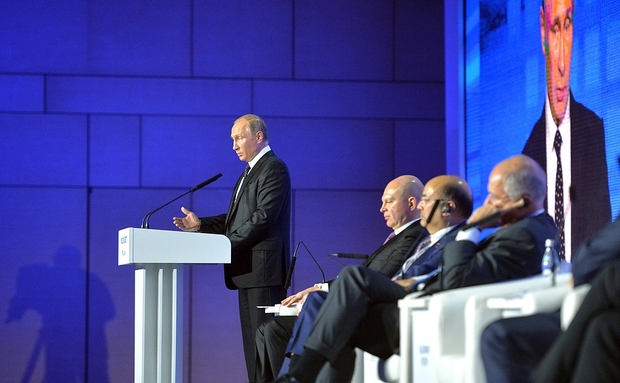Russian government keeping admirable macroeconomic balances
The country's economy is weakened by sanctions and low oil prices, but its key stability indicators are not that bad. Russia's competent macroeconomic management is the reason. However, investment, GDP and living standards are still falling.
How Russia stays afloat? Anders Aslund, a Swedish economist and senior fellow at the Atlantic Council in Washington, DC, answers this question in his commentary for Project Syndicate. He compares Russia's current economy with the Soviet system in the early 1980s. The common features include low oil prices, state control over key industry sectors and authoritarian style of leadership. But the state's macroeconomic management is much more competent today than it was thirty years ago.
Since oil prices began falling in June 2014, Russia has moved from 6th place to 14th in the International Monetary Fund's global economic rankings. Furthermore, the country's GDP (in dollar terms) has reduced from $2,1 trillion to $1,1 trillion. Meanwhile, the Russian government has kept admirable macroeconomic balances, even as growth prospects have faded. In 2014, Russia's international reserves decreased dramatically, but at the end of the year, the Central Bank of Russia decided to cut the ruble's bind to the dollar. As a result, macroeconomic conditions have since stabilised.

For Vladimir Putin, international reserves are the most important factor of stability, states the author. At the annual Russia Calling! investment forum in October, the president of Russia reported that the '...reserves are growing. They currently stand at around $400 billion'. At the same time, the Ministry of Finance's Reserve Fund, which is part of the international reserves, is likely to be exhausted in 2017.
Other indicators of stability for Putin are the foreign-payments balance, the budget balance, the inflation and the unemployment rate. The latter is currently 5,4%, and it hasn't exceeded 6% since the drop in oil prices. Besides, Russia's public debt is only 13% of GDP. Inflation, which jumped above 16% at the beginning of 2015, has since reduced to 6%. The budget deficit stays at around 3% due to cutbacks in all spheres including education, health care and pensions. But overall investment, GDP and living standards are still falling. Real disposable incomes fell 10% last year and will likely lose another 5-6% this year. Investment was down by more than 8% in 2015 and will probably decrease by 4% this year. GDP declined by 3,7% in 2015, and this year's forecast is less than a 1% decrease.
The author considers that Donald Trump's victory in the U.S. election has created a power vacuum in Washington, so Putin has a great opportunity to boost his own domestic standing. 'He is financially constrained, but his situation is not hopeless, and we should always expect the unexpected from him.'